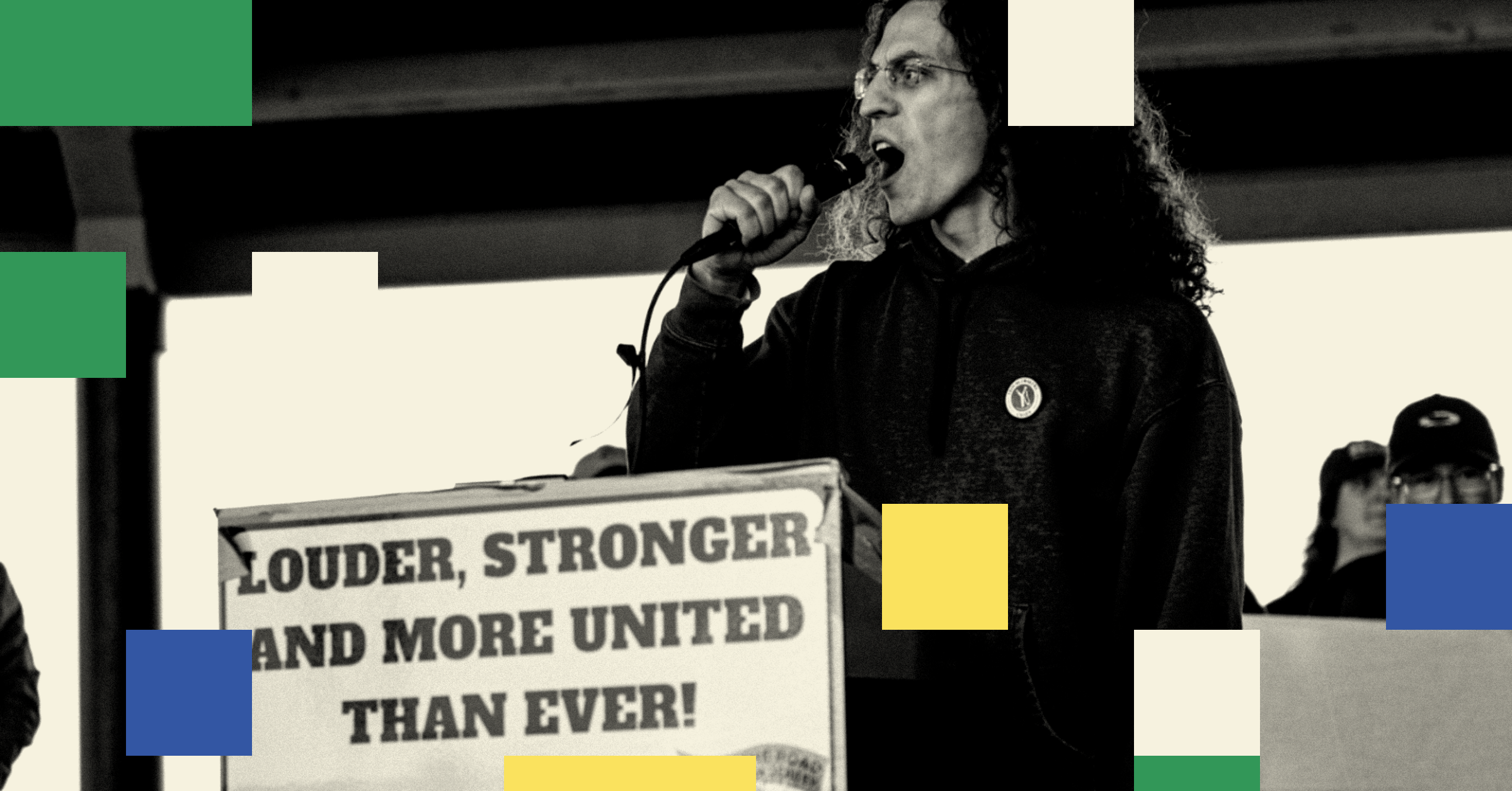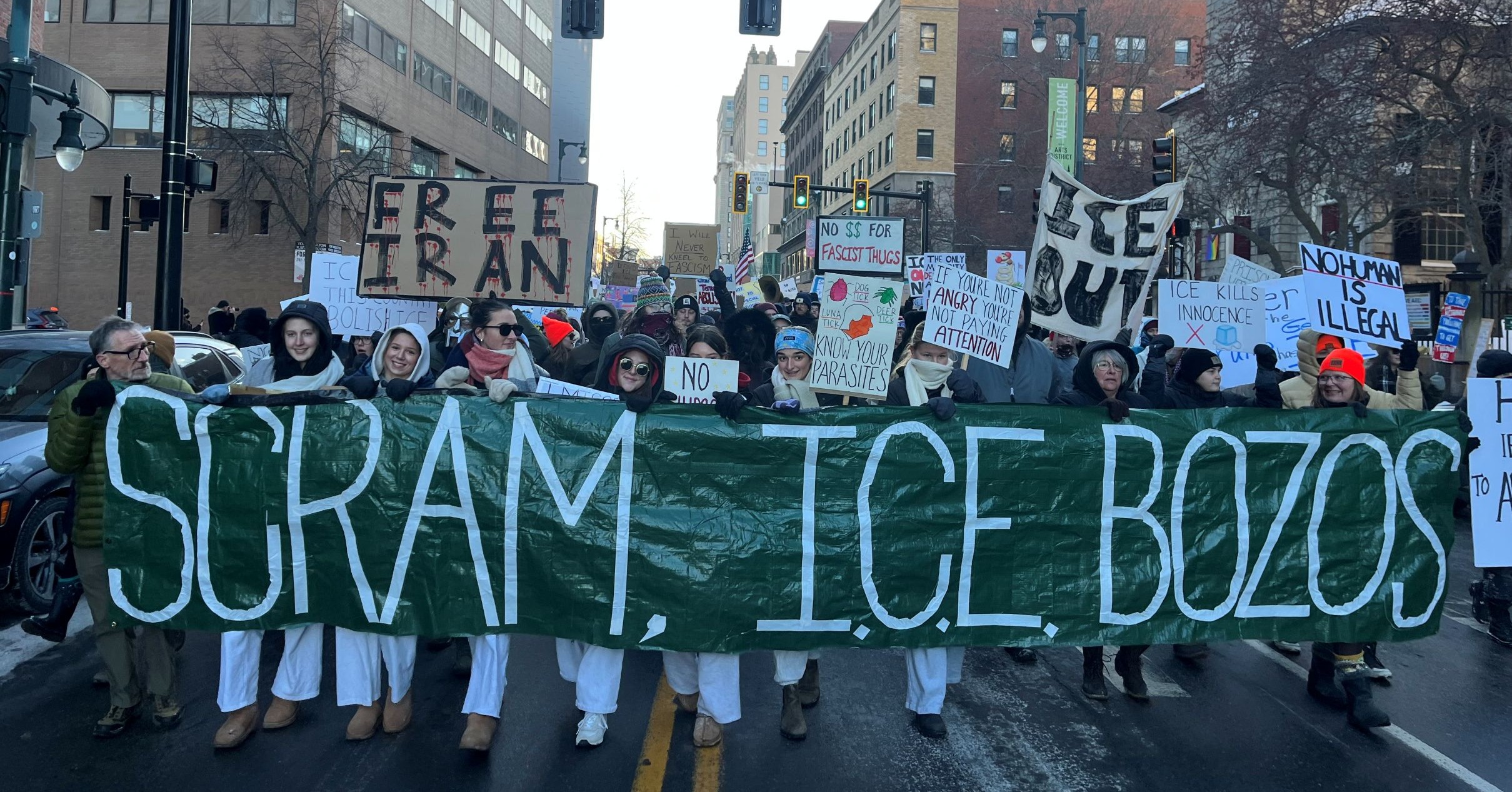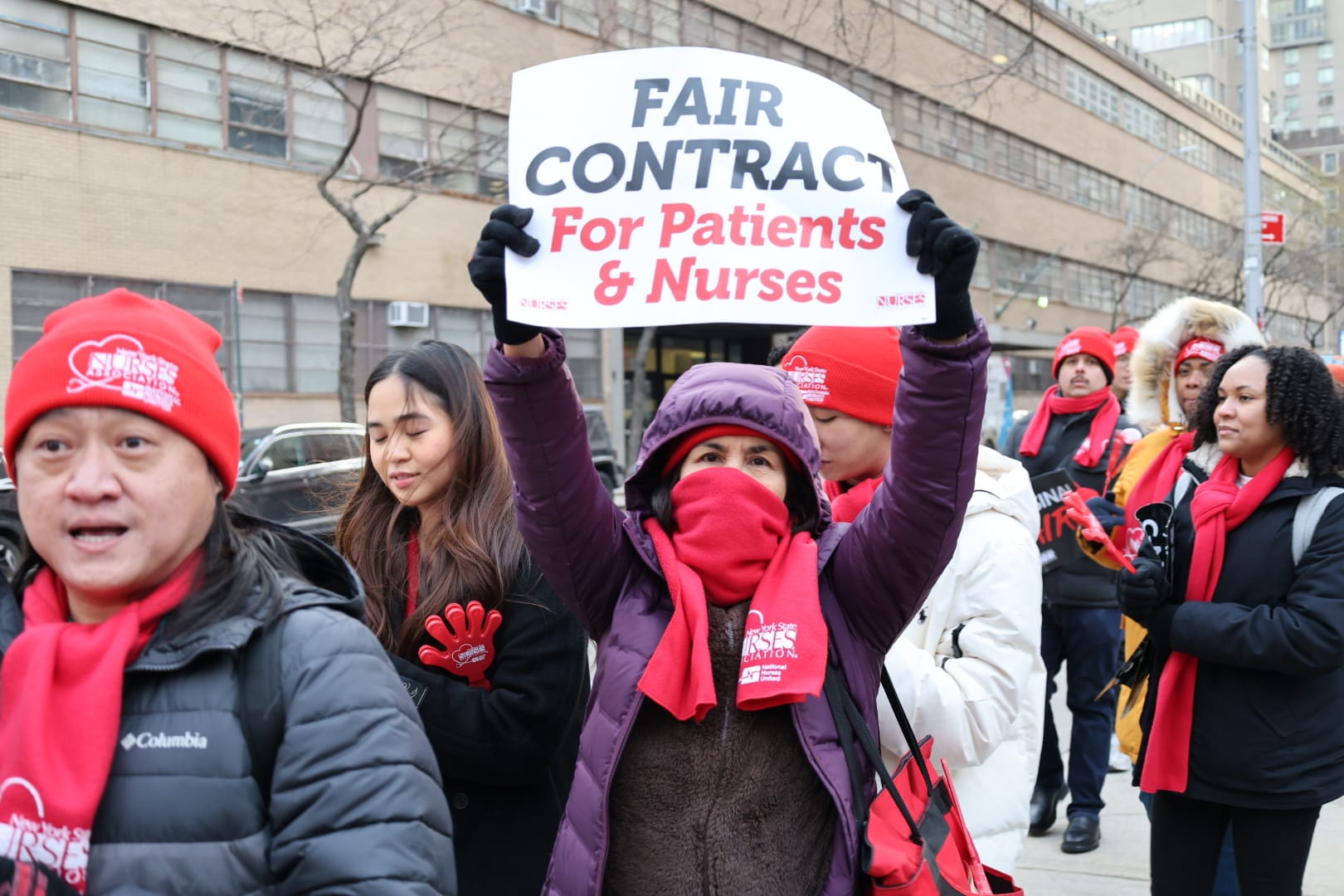Jake Ephros is running for Jersey City Council as a proud DSA member. Halsey Hazzard interviewed him about the issues in his district, the campaign’s platform, and his relationship to DSA for The Call.
What are the biggest issues facing your district? How are you addressing them in your platform?
The issues in Ward D are similar to those around most of Jersey City, namely housing and generally, quality of life. The cost of living is just so crazy expensive here. At one point we were named the most expensive city to rent a home in the entire country. It’s a city that is 70% renters.
We hear time and time again that people just want clean streets. When it’s windy, you’ll see tornadoes of trash spinning throughout the sidewalks. And we have potholes — there’s an unwillingness for anyone to take responsibility for paving the roads, with the city and the county going back and forth. So we have dangerous potholes and messed up roads throughout the ward.
We want to be really ambitious with universal rent control. Can we expand our local rent control laws to cover every single tenant in Jersey City? Can we not only build more affordable housing on the measly 10% in our current inclusionary zoning ordinance, but actually build public social housing in the city so that we have permanently affordable units that are off the market and expand the supply of housing? This is a line in the sand that we want to draw: we’re not just a good progressive campaign that wants to talk about affordable housing. This is what democratic socialist politics looks like. It looks like universal ideas that challenge the power of capital.
Similarly with public services: We contract out garbage; we should municipalize that so we’re not reliant on this monopoly of the garbage contract which has failed to keep our streets clean. We should claw back our public utilities like sewage and water, which are contracted out to a private company, Veolia. Residents have no democratic say in the rate hikes that we’re experiencing, so we should municipalize that and bring that under city control.
We should have municipal grocery stores that are not for profit, that are run by the city. This policy platform is the difference between a campaign that talks about affordability and one that has ideas for bringing things back under democratic control to both build working class power and save working class money.
Let’s talk about the Heights, why you are running for office, and what’s going on in the district that helped support this campaign.
The Heights is a working-class neighborhood. About 70% of households make $100,000 a year or less. It’s a really diverse neighborhood. I think there’s a plurality of white people, but then there’s Latinos, South Asians, and Black folks.
It’s also on the precipice of a lot of the demographic changes that we’re seeing. More and more money is coming in, younger, wealthier white families are coming in, and this is part of the demographic shift that we have been seeing for a long time in downtown Jersey City, especially. We have to act now to make sure that nobody gets kicked out who has been here for generations and generations, and who can’t afford to stay here if we have new luxury condos cropping up every other block. This is a really important moment where the Heights needs an independent voice to stand up to a city that is predominantly run by politicians who are in the pockets of big real estate and developers.
I’m running because I want to build on the work that I’ve been doing as an organizer, especially with DSA. I was involved in the labor movement, on staff with 1199 SEIU organizing with healthcare workers across Jersey, including representing nursing home workers who live and work here in Jersey City. After working in the labor movement, I started teaching at Hudson County Community College, where I teach English, and St. Peter’s University, where I teach political science. Through these jobs, I get to meet a lot more students in the community. Through my work in the labor movement and the Right to Counsel campaign, I was seeing more and more of the capitalist system bearing down on workers across Jersey and in Jersey City.
When I got to the Heights, I had been involved in immigrant justice organizing, particularly around organizing to shut down the ICE jails in New Jersey, including the one in Hudson County I was also involved in knocking doors for DSA candidate Joel Brooks, who was running for City Council in a different ward at the time, and who is a City Council candidate now as well, also endorsed by our local DSA chapter. From knocking on doors across the west side, we learned that the housing crisis is affecting people so severely. After Joel very, very narrowly lost his campaign in 2021, we pivoted to figuring out, as a DSA chapter, what we can do to address the fact that the rent is skyrocketing out of control in Jersey City.
We developed this campaign to win a tenant’s Right to Counsel, where we could establish a municipal office in Jersey City to make sure that renters would have access to legal defense in the case of things like unjust evictions. When you go to housing court, over 80% of the time landlords have lawyers, but 3% of the time tenants have lawyers. We wanted to balance that playing field and build power among tenants. I helped lead that campaign as the chair, and we had a unanimous, 9-0 vote by the end of it. We won a fee on developers so that developers who are at the root of this housing crisis, hiking up the costs for everyone, are monetarily contributing to both the Affordable Housing Trust Fund and to this new office of Right to Counsel.
What role has DSA played in this campaign? Are any other organizations and movements involved?
DSA was the driving force behind Joel’s campaign in 2021 and is going to be the driving force behind both of our campaigns in 2025. We are also really intentional about expanding and bringing in working people who may not already be in our socialist organization. There are some other groups that have been doing really great work that we’ve been partnering with. On the Right to Counsel campaign DSA was the leading force, but we partnered with tenant organizations and some housing nonprofits too. I’m hopeful that we can continue to work with labor and some other activist groups.
Last night, a DSA organizer put together an awesome rally in front of City Hall, where Joel and I spoke. We had candidates for State Assembly, we had 32BJ SEIU, which represents residential building workers in Jersey City, on the steps of City Hall. We had Movimiento Cosecha, which is doing a lot of rapid response work around undocumented immigrants.
You’re running as an independent, so you’re not running as a Democrat, but basically as a DSA candidate. How are you thinking about how your campaign fits into the project of building an independent party?
Jersey City is a Democratic stronghold. Hudson County is a Democratic stronghold, and we see a deep, deep dissatisfaction with the Democratic Party nationally, of course, but also right here at home in Jersey City. Rob Menendez Jr., son of the convicted Bob Menendez, the former New Jersey senator, represents this district. He won that primary, but he had a more progressive challenger who did extremely well and ran away with this part of the district, which encapsulates my neighborhood, the Heights. So we see a level of dissent here.
An even better example would be the Uncommitted Campaign. We had unusually high levels of uncommitted voters relative to the rest of New Jersey here in Ward D. I was helping to do some door knocking and organizing for that, and DSA helped lead. So I see this campaign as building on this dissent and dissatisfaction with the Democratic Party.
I don’t know if we should be looking to have a formal independent political party in the next year or two years, but this is where we need to go. I think we can make it happen locally, especially in places where we have nonpartisan elections, like here. I don’t have to run in a Democratic primary, so we get to run straight to the general and distinguish ourselves among a field of mainly just Democratic candidates, and say: this is why democratic socialism is different. This is why being part of an organization is different. This is why being an organizer and being rooted in different social movements, from immigration justice to housing justice, makes a big difference.
Demonstrating that through the campaign, and – hopefully when we get elected – through being in office to organize, using our roles as electeds to organize – that will be the crux of that independent party building that we need to do.
How are you thinking about governing if you’re elected? Are you looking at other DSA elected officials around the country, and what they’ve been able to do?
I got to knock doors for JP Lyninger in Louisville last May and see firsthand a winning campaign. I’ve also been talking to Richie Floyd in St. Petersburg, Florida, and Jesse Brown in Indianapolis, and I’m excited by their projects. Richie is building this long-term project to get more and more DSA candidates into government, and Jesse is currently going through this wild ride of being kicked out of the Democratic Party. It’s an exciting time to have other comrades who are doing this local municipal work. But it’s going to be a learning curve, and I’m going to need to rely on our organization to make it happen.
How are you planning to relate to DSA?
I will always proudly wear my label of being a DSA candidate or elected. I want to actively be growing our organization through this campaign and through being elected. I see a lot of promise. We have a really good group that already can serve as the basis for myself, and hopefully Joel, to go back to and be like, “Hey guys, this is what’s going on inside City Hall. This is the kind of help we need to organize around it,” or “Let’s democratically deliberate over how we approach this affordable housing bill. Can you help come up with some policy alternatives? Can you help organize community meetings with the constituents, so we can engage more voices?” We see so many well-meaning progressives go into city government or state government or federal government and get sucked up by the system. I don’t want that to happen.
What’s your long-term vision for Jersey City?
The vision is: working people are empowered. Corporations and developers don’t get to decide how the city’s developed, but working people do. If we want to see a building come up in our neighborhood because it’s going to house 10 more families at a permanent affordable rate, that’s a decision that we get to make collectively. People are empowered so that we have safe, clean, well-lit streets. Our roads are paved so that people can bike and walk to work without feeling like they’re going to get mowed over by someone who’s pretending that we drive on highways within our neighborhood, instead of the normal streets that we have.
It looks like a place that people can afford to stay and raise a family here and retire here, and be able to access more museums, more arts and culture, and take on the amazing stuff that we already have, and put resources into it, instead of putting resources into the hands of the Kushners and other real estate giants that currently donate.




